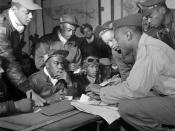In WW2, non-combatants and minorities were affected in a huge way as they were affected in many different ways. There were all sorts of different types of non-fighter's, such as women, POW's and the Tuskegee Airmen that were affected by such things as rationing and resistance. Even though each of these groups had their different struggles, they were all similar in that WW2 was a difficult time for all of them, but furthermore it was also a time for each and every one of them to be given a chance to prove themselves.
To start, women had always experienced a time of struggle during war as they were never allowed to participate in battle, but rather left at home to both continue managing their homes and also take up the workload of the men. This was a difficult thing for women as much of the work they had to do in place of the men, such as farming and factory work, were things that were much harder than what they were used to and adapting was a difficult thing to do.
However, by learning their capabilities through doing such things as these, they later went on to even join in on the war effort, even if the majority were just nurses, but none the less they played an important role and some even began to combat in the end.
Minorities were a huge group that suffered greatly during the war as well. Those that did join in on the war effort were often still discriminated against after the Civil War and WW1, which made it very difficult to work when those on your side were in a sense against you. But minorities still got their time to shine in the war as well, through groups such as the Tuskegee Airmen...


